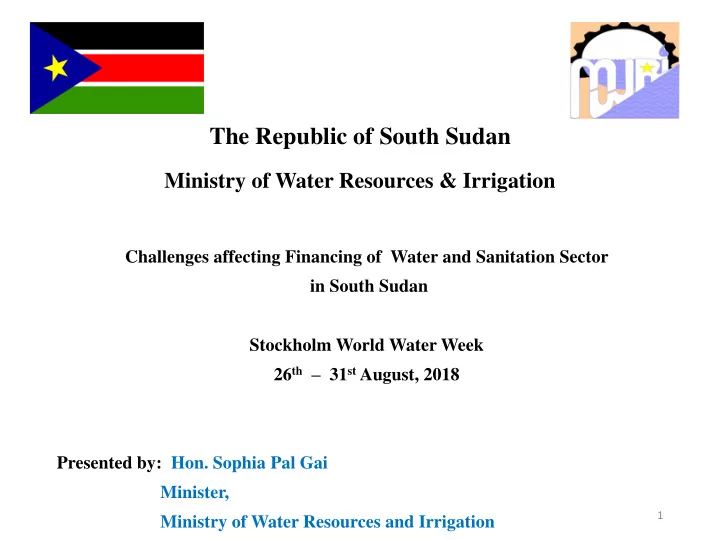

The Republic of South Sudan Ministry of Water Resources & Irrigation Challenges affecting Financing of Water and Sanitation Sector in South Sudan Stockholm World Water Week 26 th – 31 st August, 2018 Presented by: Hon. Sophia Pal Gai Minister, 1 Ministry of Water Resources and Irrigation
Outline of the Presentation ▪ Introduction ▪ Challenges affecting WASH sector in South Sudan/ Lessons Learnt ▪ Opportunities and way forward
REPUBLIC OF SOUTH SUDAN Juba
SUDD SWAMPS – WHITE NILE RIVER South Sudan is blessed with Plenty of Water but Sparsely distributed
Introduction ▪ South Sudan suffered from a protracted civil war for more than hundred years between the South and North of Sudan. ▪ South Sudan attained its independence in 2011 and became a sovereign nation ▪ There are three levels of government administration : National, State and County ▪ The Population is 12.6 Million (Urban 19% & Rural 81%) 5
Cont’d… ▪ The Sanitation coverage estimated at 10% ▪ The water coverage estimated at 50% ▪ 61% of South Sudan population practicing Open Defecation ▪ Government WASH budget per capita for Sanitation is < 0.1% from the National Budget ▪ Currently Peace Agreement between the parties has been signed and implementation matrix negotiation is in progress . 6
Seasonal River
Key Achievements: Development of WASH Legal Framework: ▪ Water Policy developed (2007) ▪ WASH sub-sector Strategic Framework (Rual WASH, Urban WASH, WRM) – 2011 developed. ▪ WASH Action and Investment Plans (Rural & Urban) – 2011 - 2015/2018 Corportate plan is implemented and reviewed. ▪ The Draft Water Bill - to regulate Water Resources Mangement and WASH service delivery, awaiting for enactment from the legislators. 8
Cont’d… ▪ WASH Technical guidelines & Manuals developed. ▪ Drinking Water Quality guideline in use. ▪ Irrigation Development Master Plan Developed and ready for final approval from legislators. 9
Governance and Institutional Governance and Institutional Development: Development ▪ Establishment of WASH Information Management Systems (WIMS). ▪ Local service support transfers (LSS) ▪ Adaption of Gender mainstreaming in the water sector at all levels. ▪ Establishment of WASH Training Centre for capacity development with the Support of the Netherlands Government. ▪ Secondment of technical staff to specific projects in the states ▪ Sector Coordination mechanism ▪ Adaption of the community led total sanitation (CLTS) as a strategy to scale up sanitation to end open defecation ▪ Adhering to South Sudan Environmental Policy framework in all projects. 10
Key Challenges ▪ Continous political and economic crisis hindering implmentation of key milestones (shifting development to humanitarian response/ life serving). ▪ No budget allocation for capital expenditure for more than 6 years. ▪ Donors fatique to support most of the development projects. ▪ Inadequate human resources
Cont’d… ▪ Massive displacemnet and population movement( IDPs) has affected the infrastructual development. ▪ Fragmented sanitation (MoH, MLHUP, MWRI, MEF) as a result it limits the prioritization of sanitation sub-sector ▪ lack of historical data for decision making and financing. ▪ Water born diseases burden – Cholera, Malaria, Typhoid and Guinea Worm ▪ High Mortality rates in the country. ▪ Limited private sector participation in WASH sector. 12
Interventions to prevent open defection
Opportunities • Peace process implementation • Human Resources will attract the skillful force from the neighboring countries • Attraction of investors • Full implementation of all legal framework • Full counties participations/ ownership • Schools WASH program
Way Forward ▪ Resources Mobilization ▪ Provide sector investments (Investment Plan) ▪ Strengthening of information management system for evidence based generation. ▪ Gender mainstreaming & creating sanitation for employment opportunities. ▪ Technological research. ▪ Alignment of the country national strategy development agenda with SDG’s as well as Ngor commitments and AMCOW Strategy
Thank You
Recommend
More recommend